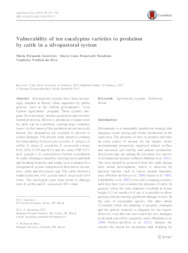Vulnerability of ten eucalyptus varieties to predation by cattle in a silvopastoral system.
Vulnerability of ten eucalyptus varieties to predation by cattle in a silvopastoral system.
Author(s): GUERREIRO, M. F.; NICODEMO, M. L. F.; PORFIRIO-DA-SILVA, V.
Summary: Silvopastoral systems have been increasingly adopted in Brazil, often supported by public policies, such as the federal government's "Low Carbon Agriculture" program. These systems integrate diversification, income generation and environmental protection. However, predation of mature trees by cattle can be a problem, causing large economic losses. As the causes of this predation are not precisely known, few alternatives are available to prevent or reduce damages. The present study aimed to evaluate the vulnerability of Eucalyptus grandis, E. saligna, E. pellita, E. dunni, E. urophylla, E. urograndis (clones I144, I224, C219 and H13) and the clone COP 1277, an E. grandis 9 E. camaldulensis hybrid, to predation by cattle. Damages caused by chewing leaves and bark and breaking branches and trunks were evaluated in a silvopastoral system comprised of Brachiaria decumbens, cattle and Eucalyptus spp. The cattle showed a marked selection of E. grandis and E. urograndis I144 clone. The eucalyptus types least prone to damage were E. pellita and E. urograndis H13 clone.
Publication year: 2015
Types of publication: Journal article
Keywords: Agroforestry systems, Danos, Eucalyptus, Herbivory, ILPF, Madeira, Sistema silvipastoril, wood
Observation
Some of Embrapa's publications are published as ePub files. To read them, use or download one of the following free software options to your computer or mobile device. Android: Google Play Books; IOS: iBooks; Windows and Linux: Calibre.
Access other publications
Access the Agricultural Research Database (BDPA) to consult Embrapa's full library collection and records.
Visit Embrapa Bookstore to purchase books and other publications sold by Embrapa.

